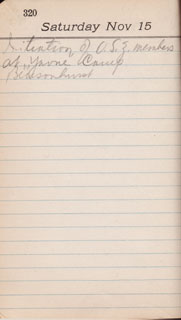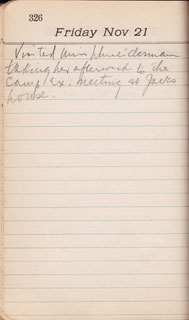
[Note: This postcard is the first note Papa wrote to my grandmother while he was at a Zionist Organization of America conference in 1926. To see large-sized images of the card, click the thumbnail images on the right of this page.]
——–

Sat. Morning
My dear Jeanie:
Well I am here, I retired
in my sleeper in N.Y. and awoke
this morning in Bufalo. It is
a fine town. I am now preparing
my ammunition to shoot pictures
at Niagara Falls. It feels great
to be here among so many
co-idealists,1 There is no sea as
in Long Branch2 but I’ll have
enough of the falls. My friends
are rushing me and the bus is
waiting to take me to the falls.
I therefore write only a card3
Harry
—————
Matt’s Notes
1 – Papa was in Buffalo “among so many co-idealists” at the 29th annual convention of the Zionist Organization of America.
2 – Five days earlier, Papa had gone to Long Branch, New Jersey to attend the convention of Order Sons of Zion (a.k.a. B’nai Zion) the Zionist fraternal order and mutual support society to which he belonged. The New York Times briefly described this gathering:
Sons of Zion in Convention
Long Branch, N.J. June 20 –
Two hundred delegates and as many
more visitors attended the opening of
the seventeenth annual convention of
the order Sons of Zion at the Scarboro
Hotel today. Commissioner W. Stan-
ley Bouse welcomed the delegates.
Louis Lipsky, Chairman of the Zionist
Committee, spoke. The convention
closes tomorrow, when new officers
will be installed.
And, the next day:
Sons of Zion Elect Officers
Long Branch, N.J. June 21.–
The Sons of Zion, meeting in the Scar-
boro Hotel here today, elected Sol
Friedman of New York, President;
Judge Jacob S. Strahl, New York, Vice
President; Jacob I Kiskor, Brooklyn,
Secretary, and Max Fenwick, New York,
Treasurer.
Long Branch was a well-established beach resort community at the time, less than 20 miles as the crow flies from Papa’s usual seaside haunts at Coney Island:

Papa probably attended the Sons of Zion conference with the same fraternal brothers, like Blaustein, Bluestone, and Zichlinsky, that he used visit Coney with in 1924. The conference may have been all business, but I’m sure Papa’s ocean-loving crew found a moment to join the frolicsome crowds on the beach, like those pictured in this 1923 photo of Long Branch:

Here’s a shot of Long Branch’s Broadway as it may have looked to Papa during the busy summer season:

And here’s the Scarboro hotel, where the B’nai Zion conference took place and where Papa most likely stayed. According to Eddie at historiclongbranch.org (the source of all these Long Branch images) the corner of Bath and Ocean Avenues saw two incarnations of the Scarboro hotel over the years, but by the time Papa got there the newer, modern version was in place:

We should also note that Judge Jacob Strahl, the newly elected President of B’nai Zion mentioned in the Times article above, made a couple of personal appearances in Papa’s 1924 diary: one in which Papa accompanied him home from the Bronx after a lecture, and one in which Papa attended a dinner in his honor.
3 – The front of this particular card reads:
67:–Statler Hotel and McKinley Monument, Buffalo, N.Y.
Buffalo was the site of hotel pioneer E.M. Statler’s first permanent hotel. Built in 1907, it featured amenities for which his hotel chain would later become famous: cheerful service, affordable rates, and luxuries, like bathrooms in every room, normally unavailable to proletarian travelers. (As my legions of readers who get together each weekend to quiz each other on Papa’s Diary trivia no doubt are aware, my comments on Papa’s January 30th, 1924 diary entry quotes a brochure about Statler’s Hotel Pennsylvania in New York that advertises these very sorts of advantages.)
Like the Hotel Scarboro in Long Branch, the above-pictured version of the Statler Hotel that Papa stayed in was not the original, but a second incarnation. Statler built it in 1923 (and renamed the first Statler the Hotel Buffalo) so when Papa stayed there in 1926 it must have still felt fresh, novel and impressive. It may well have been the most comfortable place that Papa ever stayed, since until then he had known only Jewish ghetto life in Eastern Europe and tenement life on the Lower East Side of New York. Developers converted the building to office space in 1984 and renamed it Statler Towers, but as of this writing it’s under new ownership and on its way to becoming a mixture of condominium, hotel and commercial space.
Interestingly, Papa addressed this card not to my grandmother’s home on Hart Street in Brooklyn, but to an address just around the corner at 185 Pulaski Street. No one in my family is entirely sure what was at this address, but we think it was a factory owned by my great-grandfather and that my grandmother worked there. This is probably right. Mail was delivered twice a day in those days, so Papa would have addressed letters to her daytime address to make sure she got them as soon as possible. Perhaps he thought this would give him an advantage over other suitors who, he was convinced, were competing with him for her affections.
————
References:















